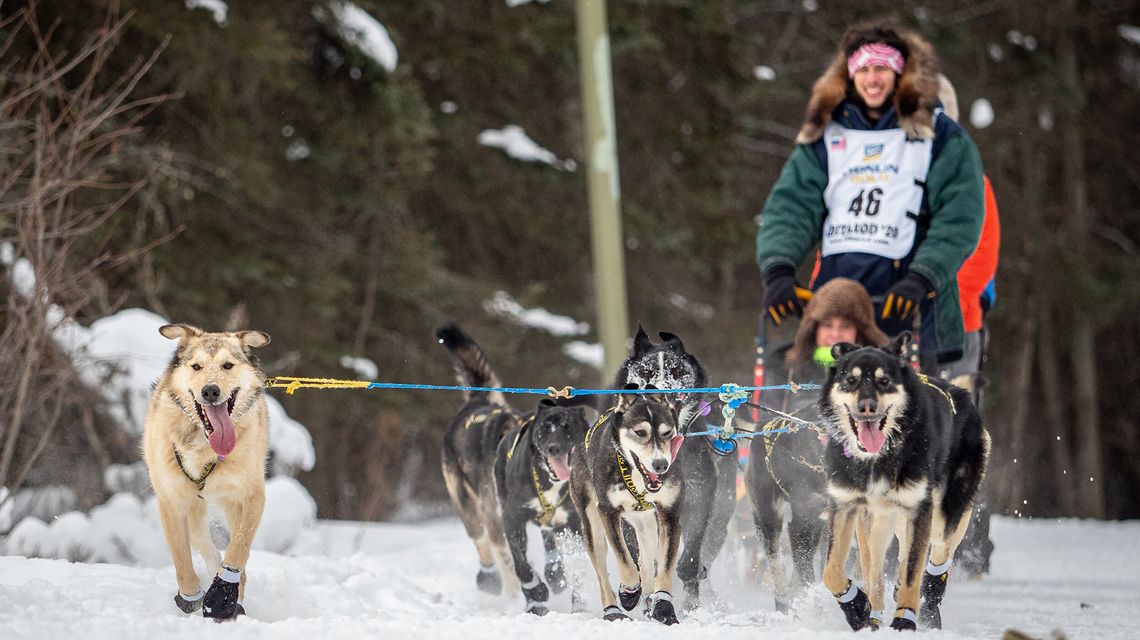
From the Deep South to the Far North: Georgia boy turned musher
ATLANTA (BVM) — Growing up in Georgia, you become accustomed to warmer weather. The winters are mild, and you may never see snowfall. States that see snow are on the opposite side of the country. So the fact that Atlanta native Sean Underwood ended up in Alaska as a musher is not normal. But that was exactly the plan.
“I didn’t want to graduate college and get a day job and that be that,” Underwood said. “I wanted to branch out.”
So following his graduation from Georgia Southern University, Underwood began his adventurous lifestyle. His escapades began in South America, Chile to be exact, where his grandfather was born and raised. The 28-year-old says he spent time connecting with his family and learning of their culture and was actually prepared to move to Chile.

“It was too complicated to find a visa that would allow that,” Underwood said. “So I went back to Atlanta and thought ‘Well I know I can’t move to Chile, but I want to go someplace far away and cool.’”
The brainstorming led him to think of his aunt and uncle up in Alaska. He gave them a call and never considered how life-changing this would eventually be. They told Underwood that they’ve been doing commercial fishing on Kodiak Island for 40 years, and that was all he needed to hear. On a whim, Underwood asked if they needed help and he was hired. Off to Alaska.
The experience was completely new for Underwood, who grew up in a metro area, but he fell in love with it.
“Watching those famous Kodiak grizzly bears rumble around the backyard, we were living totally off the grid,” Underwood said. “Catching our own food, drinking water out of a creek, no internet, no phone coverage, no roads, the only way to get there was on a float plane.”
That’s how he ended up in Alaska, and getting into dogsled racing followed naturally. Underwood said that he wanted to get immersed in the Alaskan culture, and dogsled racing was one of the most authentic forms of that. Coincidentally, his aunt and uncle were good friends with Jeff King, who Underwood described as “the Michael Jordan of mushing.” King is a four-time Iditarod champion.
“My aunt and uncle called Jeff and he told me it wouldn’t be a good paying job,” Underwood said. “He’d give me a place to stay, some grocery cash and the opportunity to learn.”
He took King up on the offer and has been working as a part of his team for three years now. Underwood says he knows some of the dogs even better than King because he’s been working with them since they were born. His first winter as a dog handler for King, he ran a 200-mile race, and the following winter he ran a 300-mile race. Underwood didn’t know it at the time, but it turns out he was preparing for the experience of a lifetime.
This past winter, King was set to race the Iditarod. He was in Anchorage doing his pre-race dinners, events and interviews when he came down with a stomach ache that turned out to be a serious intestinal situation. The Iditarod legend had to get surgery, and that wiped out his chances to be ready for the big race. He called Underwood to let him know that he wanted him to take his place.
“I knew I’d be the guy to do it because I was just the next person up,” Underwood said. “The funny thing is that he was on pain killers and whatever and when I hung up the phone I said ‘Wait a second, they just messed around with his organs. Is he ok to be telling me this kind of stuff?’”
After getting official Iditarod approval on the swap, Underwood says he did a lot of pacing. Everything he needed was already out on the trail’s checkpoints waiting for his arrival: Dog food, human food, amongst other things. All that was left for him to do was grab his parka, boots and mittens and step into the sled. This run would be 700 miles more than the longest one he had ever before completed.
But four days after the call, Underwood had no choice but to set out on this journey, and he was thrilled. Fortunately, the weather was cooperative for the most part, being in the 30s during the day and 20s during the nights. But that didn’t completely prevent there from being grueling stretches. Underwood says that there were 50 mile per hour winds on top of the mountains, along with freezing rain and snow slapping him in the face so heavily that it was hard to even see his dog team.
And though he was embracing the challenge and loving every minute of it, the race took a turn for the worst when he was 96 percent through the trail. Underwood came up on a natural occurrence called “overflow.” Overflow is when liquid water amasses on top of ice, creating a potentially dangerous situation.

“The more the ice freezes, the more it’s pressing down the water beneath it and at some point, it’s got to give.” Underwood said.
In his personal experience, Underwood says the overflow was creating ponds of sleet on the Iditarod trail. Wind was blowing in from the ocean, sending the icy sea water over the ice shelf that was formed a few miles out from shore. This water was being pushed to land, where it had nowhere else to go but the trail.
Underwood says he came across his first overflow pond at around 4 a.m., and his sled immediately bogged down into it. Neither him nor the dogs could get the relatively light sled moving again. Underwood had no choice but to wait for the mushers behind him to catch up so that they could tackle the situation together.
“Two mushers came up behind us and it took us literally two hours, maybe three to help each other get through this slushy 30-yard pond,” Underwood said.
No more than a couple minutes down the trail afterward, the three teams came upon another equally large overflow pond. They attempted to cross it, but to no avail. Underwood says his boots were filling up with water after every step and at this point, he could no longer feel his legs from the knees down. The three mushers decided that this had to be the end.
“We hit the button on our GPS that calls for help and eliminates you from the race. We decided it just wasn’t worth it,” Underwood said. “Next thing you know, there’s a Black Hawk helicopter coming in to get us, straight out of World War II.”
Although Underwood and his dogs couldn’t finish the run, the experience was one that he will never forget and one that he hopes he can do again. At 28 years old, he wants to use his physical peak to be able to do these types of things. And with one Iditarod now under his belt, Underwood says that he doesn’t see himself leaving any time soon. He loves the high stakes lifestyle of the races and the stress that it brings. But above all that, his work here isn’t complete.
“I have unfinished business, man,” Underwood said. “I need to get to that finish line.”







